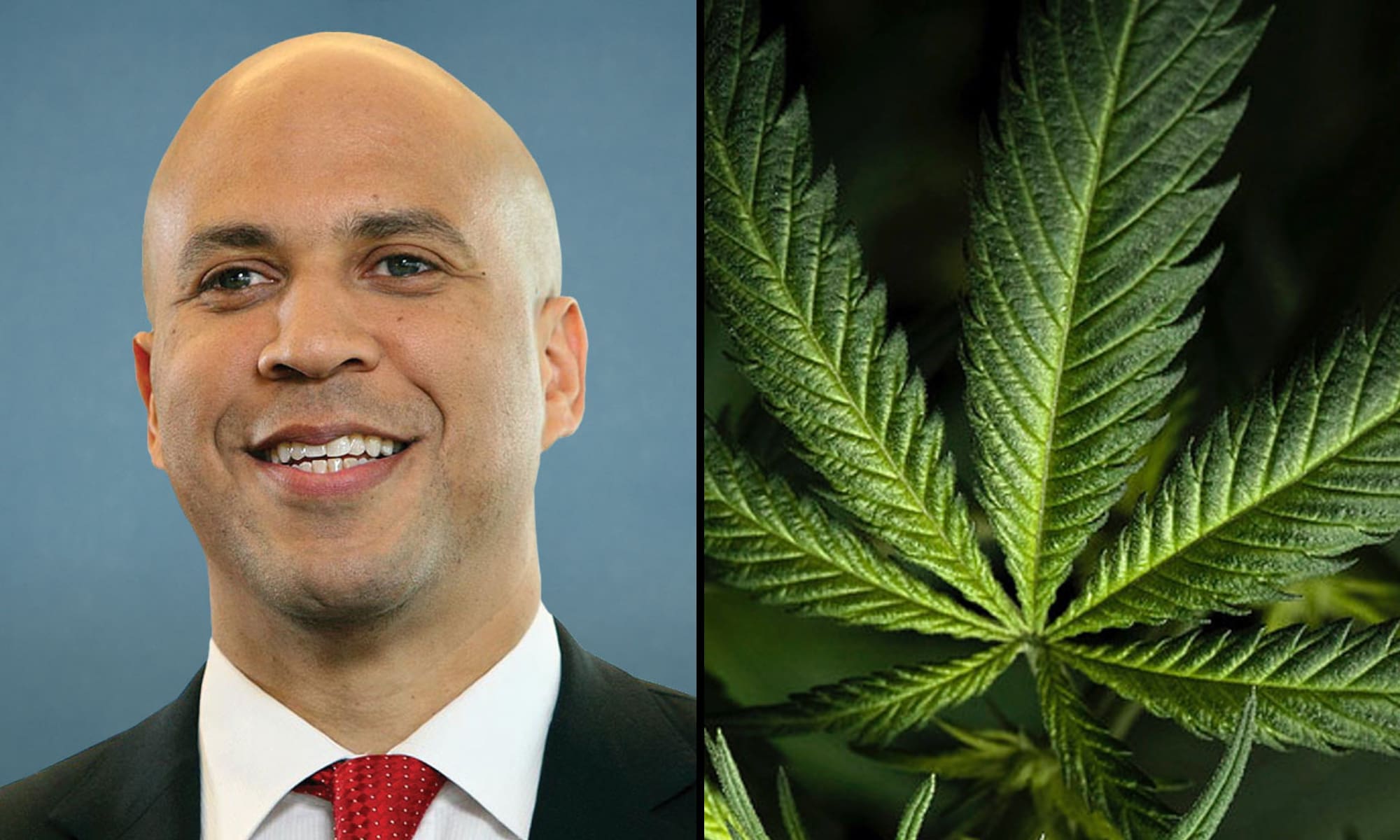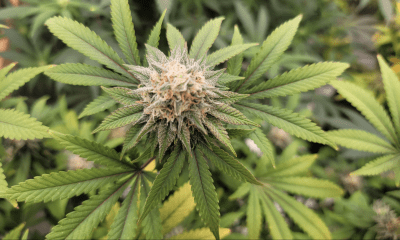Politics
Senators Are Having Marijuana ‘Conversations’ With White House To Get Biden On Board With Legalization, Booker Says

Sen. Cory Booker (D-NJ) isn’t deterred by President Joe Biden’s opposition to marijuana legalization and says that he and his Senate colleagues will be talking to the White House now that they’ve released draft reform legislation.
The senator on Friday took another round of questions on Twitter about the Cannabis Administration and Opportunity Act (CAOA), which he introduced this month alongside Senate Majority Leader Chuck Schumer (D-NY) and Senate Finance Committee Chairman Ron Wyden (D-OR).
While many of the questions concerned Booker’s stance on marijuana banking issues—as they did when he solicited input earlier in the week—he responded to another post asking how he plans to get the president and vice president on board. That’s been a top question in the minds of advocates who worry that Biden’s opposition to broad reform means he might veto the bill even if Congress sent it to his desk.
Minutes after the senators unveiled the bill, White House Press Secretary Jen Psaki was asked at her own daily briefing about the administration’s position on the legislation and said “nothing has changed” with respect to Biden’s position.
But Booker in Friday tweeted that “now that a discussion draft of our legislation has been released we will start having conversations with the White House to get them behind our proposal.”
Now that a discussion draft of our legislation has been released we will start having conversations with the White House to get them behind our proposal. #MarijuanaJustice https://t.co/1wMbkcfhFb
— Cory Booker (@CoryBooker) July 23, 2021
It’s another insight into the senators’ procedural thinking on how to get the legislation across the finish line.
Schumer last week discussed the strategy to pass it in the Senate, where Democrats hold a slim majority. He said the sponsors will be soliciting feedback on the legislation from colleagues and work to incorporate any requested “modifications” in order to advance the measure.
There have been some serious questions about whether the three senators will be able to muster the 60 votes needed to pass the legislation in their chamber. Even with a Democratic majority, there are some members of Schumer’s own party who’ve expressed concerns about the comprehensive reform.
It’s for that reason that some industry stakeholders are frustrated that Booker is ruling out moving the Secure and Fair Enforcement (SAFE) Banking Act first, as the bill to protect banks that service state-legal cannabis businesses is bipartisan and arguably stands a much better chance of passage in the Senate.
Asked about the issue again on Friday, Booker said Congress “cannot enact marijuana reform without real restorative justice for those most harmed by the drug war.”
We cannot enact marijuana reform without real restorative justice for those most harmed by the drug war. Red states and blue states are leading the way and legalizing marijuana. It is time for the federal government to catch up. #MarijuanaJustice https://t.co/CmCUKFAIWK
— Cory Booker (@CoryBooker) July 23, 2021
“Red states and blue states are leading the way and legalizing marijuana,” he said. “It is time for the federal government to catch up.”
He also repeated his earlier point that ending federal cannabis prohibition through the CAOA would intrinsically resolve the banking and related issues.
“Our bill would deschedule marijuana, which solves the banking issue,” he said. “Additionally, our legislation would allow small marijuana producers with less than $20 million in sales annually to get a 50 percent reduction in their tax rate, via a tax credit.”
That is not to mention that our bill would take tax revenue generated from the sale of marijuana and reinvest that money into communities most impacted by the War on Drugs. #MarijuanaJustice
— Cory Booker (@CoryBooker) July 23, 2021
Our bill would solve the banking issue by descheduling marijuana. Also, our legislation would allow small marijuana businesses with less than $20 million in sales annually to get a 50 percent reduction in their tax rate, via a tax credit. #MarijuanaJustice https://t.co/AqDuWqkf6x
— Cory Booker (@CoryBooker) July 23, 2021
While the senator has maintained a firm position on legislative priorities for cannabis, his resistance to voting on the SAFE Banking Act first doesn’t mean that he’s opposed to the policy change. He clarified last week that he feels that holding off on advancing the banking reform could encourage his colleagues to support comprehensive legalization.
“This is not about headlines, this is about justice,” he wrote on Friday. “Now that our discussion draft has been released we will work hard to build support for our bill and take feedback from stakeholders, industry, and advocates.”
This is not about headlines, this is about justice. Now that our discussion draft has been released we will work hard to build support for our bill and take feedback from stakeholders, industry, and advocates. #MarijuanaJustice https://t.co/ppyHSiLFCH
— Cory Booker (@CoryBooker) July 23, 2021
The criminal justice implications of prohibition necessitate that the Senate pursue broad reform before passing something that largely benefits the industry, he said.
The War on Drugs has been a war on people—particularly people of color. Before we move on a bill that will largely benefit industry we must take care of the people most impacted by our failed marijuana policies. This doesn’t have to be an either or proposition. #MarijuanaJustice https://t.co/rPg88bZGHu
— Cory Booker (@CoryBooker) July 23, 2021
For the first time ever, the Senate Majority Leader supports a bill to end the federal prohibition of marijuana—this is a big deal. That support will help us build momentum for our bill and make significant progress on the issue. Help us get there. #MarijuanaJustice https://t.co/gH5UHi9tx3
— Cory Booker (@CoryBooker) July 23, 2021
He also noted increasing bipartisan support for legalization and expressed optimism that state actions in conservative and liberal states alike could translate into congressional action.
Red states and blue states across the country are legalizing marijuana. This issue has bipartisan support and we will work to translate that into bipartisan support in Congress. #MarijuanaJustice https://t.co/3WvJvN6aK4
— Cory Booker (@CoryBooker) July 23, 2021
During the Twitter Q&A, Booker also answered specific questions about how the bill would address social equity and help communities most impacted by marijuana criminalization. For example, there would be a loan program under the federal Small Business Administration that would assist people who’ve been disproportionately impacted by prohibition.
Our legislation would create a Cannabis Opportunity Program run by the Small Business Administration which would make loans to assist small businesses in the marijuana industry owned by individuals unfairly impacted by the War on Drugs. #MarijuanaJustice https://t.co/jhIHMQ9xVn
— Cory Booker (@CoryBooker) July 23, 2021
Tax revenue from cannabis sales would also help fund efforts to ensure that the industry is diverse, he said.
The cannabis industry must become more diverse and our bill would help achieve that. #MarijuanaJustice
— Cory Booker (@CoryBooker) July 23, 2021
Our bill would create an Opportunity Trust Fund that will fund three grant programs to create opportunity for those harmed by our failed drug war. We must provide resources to small minority-owned marijuana businesses and diversify the market. #MarijuanaJustice https://t.co/YPFI9MElIn
— Cory Booker (@CoryBooker) July 23, 2021
We must take tax revenue from marijuana sales & reinvest them into communities most impacted by the War on Drugs—our bill would create an Opportunity Trust Fund that will fund 3 grant programs to create opportunity for those harmed by our failed drug war. #MarijuanaJustice https://t.co/FiOPWQjgQR
— Cory Booker (@CoryBooker) July 23, 2021
Further, there are resentencing and expungement provisions built into the legislation.
Our bill requires a motion to be filed with the sentencing court by the individual, BOP, attorney for the gov’t, or the court. In the case where an individual is indigent our bill requires counsel be appointed to represent him/her. #MarijuanaJustice https://t.co/KbJVQiqnl6
— Cory Booker (@CoryBooker) July 23, 2021
Our bill would allow people who are in federal prison for a marijuana offense to receive a resentencing. Our bill also allows for federal marijuana crimes to be expunged. These are critical provisions of our bill. #MarijuanaJustice https://t.co/ySEkCCISz3
— Cory Booker (@CoryBooker) July 23, 2021
Finally, the senator addressed a semantic issue that’s arisen as congressional lawmakers have described efforts to end prohibition. For example, Schumer has been known to sometimes call it “decriminalization” instead of “legalization,” and Booker clarified that because it would remove marijuana from the Controlled Substances Act (CSA), “our legislation would legalize marijuana at the federal level.”
Our bill would deschedule marijuana, thereby ending the federal prohibition. In other words, our legislation would legalize marijuana at the federal level. #MarijuanaJustice https://t.co/NYfK2cZNCe
— Cory Booker (@CoryBooker) July 23, 2021
Beyond the policies that Booker discussed on social media, the CAOA would maintain the authority of states to set their own marijuana policies and remove collateral consequences like immigration-related penalties for people who’ve been criminalized over the plant.
Under the senators’ legalization proposal, a gradual federal tax rate would be imposed on marijuana sales, starting at 10 percent for the first year after the bill’s enactment and the first, subsequent calendar year. It would then increase annually, rising from 15 percent to 20 percent to 25 percent. Starting in the fifth year post-enactment, the tax would be a “per-ounce or per-milligram of THC amount determined by the Secretary of the Treasury equal to 25 percent of the prevailing price of cannabis sold in the United States in the prior year.”
While that 25 percent tax rate might seem high, the legislation builds in significant federal credits for any company’s sales that are under $20 million a year.
The sponsors have made clear they are open to suggestions for how the draft proposal can be improved, and they are actively inviting public feedback. For example, they’re especially interested in hearing about measuring cannabis potency, coordinating federal and state law enforcement responsibilities and balancing efforts to reduce barriers to entry to the marijuana industry while mitigating the influence of illicit cannabis operators.
Interested parties are encouraged to submit comments on these and other issues to [email protected] by September 1.
The three senators formally started their efforts on the legalization bill by holding a meeting earlier this year with representatives from a variety of advocacy groups to gain feedback on the best approach to the reform.
Schumer made a point in March to say that it will specifically seek to restrict the ability of large alcohol and tobacco companies to overtake the industry. Instead, it will prioritize small businesses, particularly those owned by people from communities most impacted by prohibition, and focus on “justice, justice, justice—as well as freedom,” he said.
He also urged voters to reach out to their congressional representatives and tell them that “this is long overdue.”
Meanwhile, a separate House bill to federally legalize marijuana and promote social equity in the industry was reintroduced in May.
—
Marijuana Moment is already tracking more than 1,100 cannabis, psychedelics and drug policy bills in state legislatures and Congress this year. Patreon supporters pledging at least $25/month get access to our interactive maps, charts and hearing calendar so they don’t miss any developments.
![]()
Learn more about our marijuana bill tracker and become a supporter on Patreon to get access.
—
The legislation, sponsored by Judiciary Committee Chairman Jerrold Nadler (D-NY), was filed with a number of changes compared to the version that was approved by the chamber last year.
The Marijuana Opportunity, Reinvestment and Expungement (MORE) Act passed the House but did not advance in the Senate under GOP control. But this time around, advocates are optimistic that the policy change could be enacted now that Democrats run both chambers and the White House, and as more states are moving to enact legalization.
Separately, a proposal to federally deschedule marijuana that does not include social equity components was recently filed by a pair of Republican congressmen. Those lawmakers also sent a letter to Biden last week, urging him to keep his campaign promise and reschedule marijuana under the CSA.
















